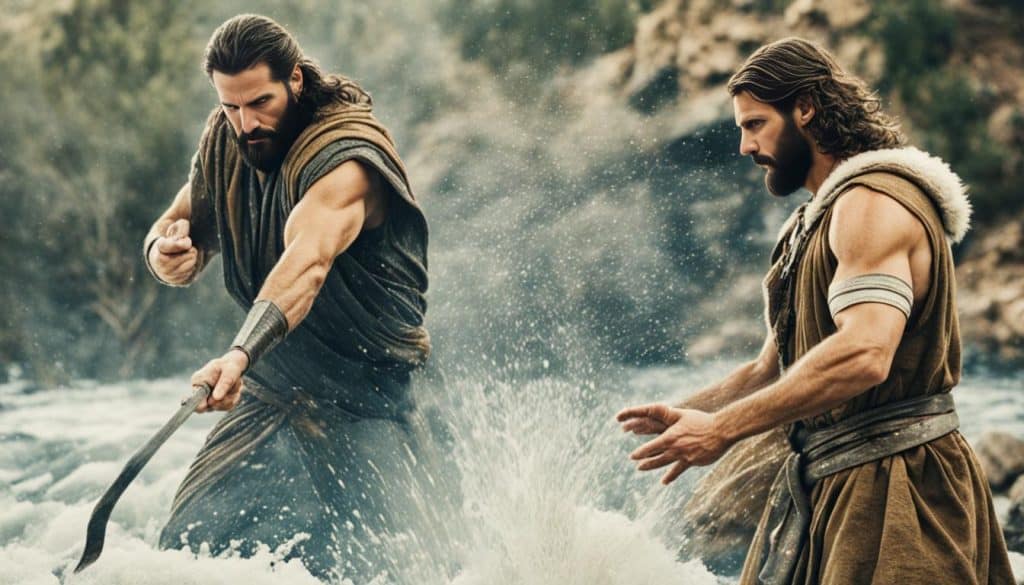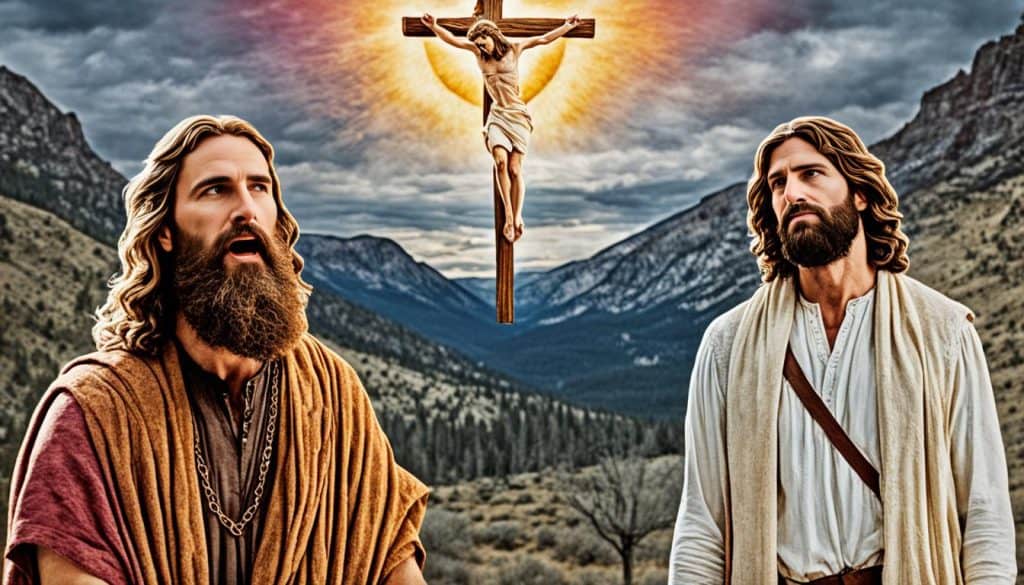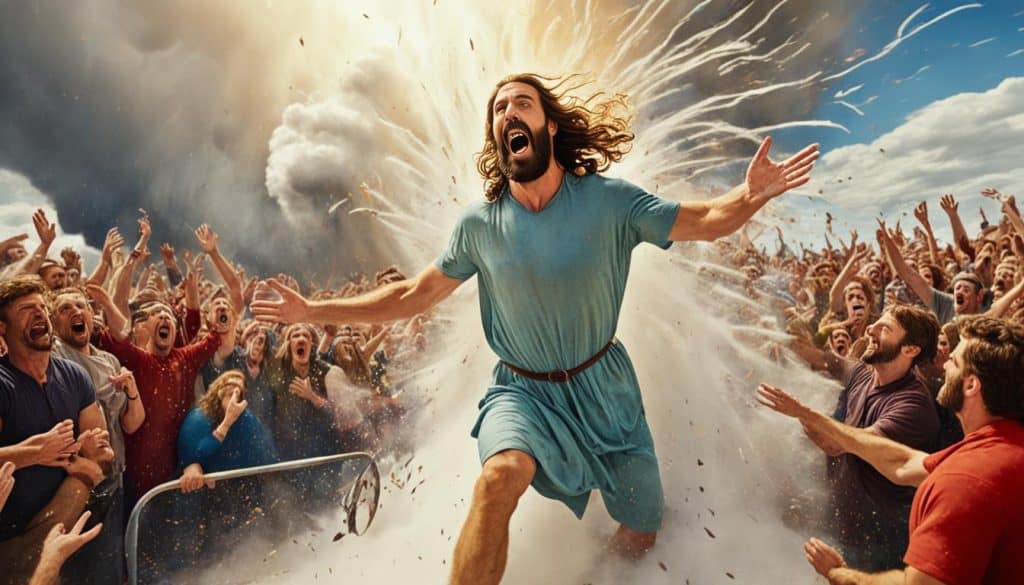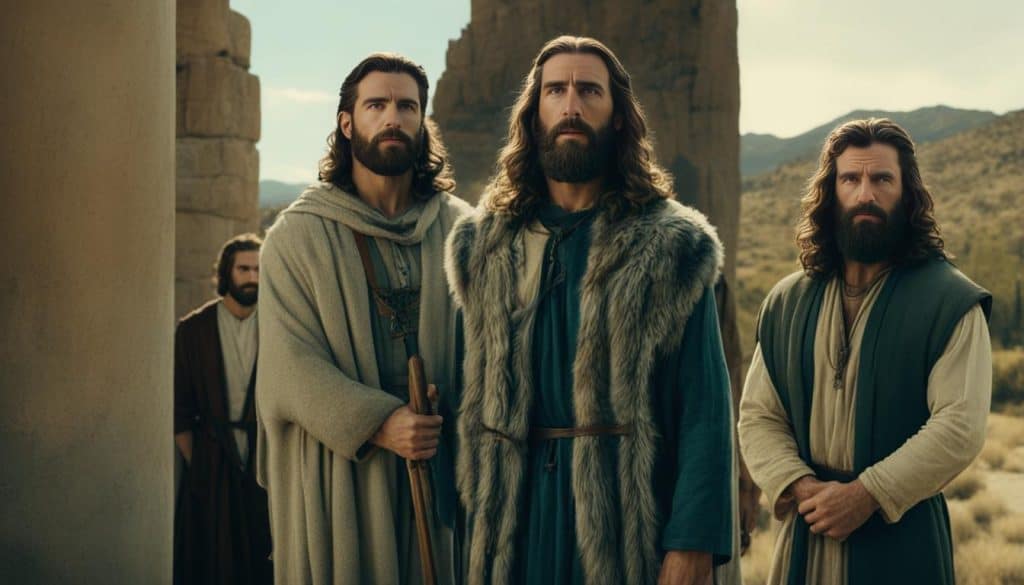Have you ever thought about why John the Baptist and Elijah are so important in the Bible? They both played big roles in saving history. Let’s look at what made them different and how they helped shape our faith.
Their stories tell us how their times in history shaped their work. By looking at John the Baptist and Elijah side by side, we learn a lot about their lives and messages. You’ll see how they called people to turn back to God and find spiritual renewal.
Introduction to Two Pivotal Figures in the Bible
John the Baptist and Elijah are key prophets in the Bible. They played important roles in biblical history. Each had a strong call from God, showing their dedication to their missions.
Elijah fought against idolatry in the Northern Kingdom of Israel. He called people back to worship the one true God. His actions and miracles showed his divine authority, making him a major prophet.
John the Baptist was a forerunner to Jesus. He preached about repentance and got ready for the Messiah. His unique style and message are still remembered in the New Testament.
Both prophets talked about turning back to God, spiritual renewal, and God’s intervention. Their unique situations and times shaped their legacies. Exploring their stories shows their big impact on many people’s faith over time.
Historical Context and Role
The stories of Elijah and John the Baptist are deeply rooted in history. Their backgrounds show us their roles and legacies as prophets. They guided Israel spiritually during tough times.
Elijah’s Role in the Northern Kingdom of Israel
Elijah was a brave prophet in the 9th century B.C. He lived when people had forgotten about God and followed false idols. King Ahab and Queen Jezebel made things worse by ignoring Yahweh’s worship.
Elijah stood up against this wrong doing. He fought hard to keep the true God’s worship alive.
John the Baptist’s Ministry in the First Century
Then, in the early 1st century A.D., John the Baptist started a new chapter. He called people to change their ways and baptized them by the Jordan River. He was getting ready for Jesus to come.
John was a bridge from the Old Testament to the New. He showed the world a new era of God’s interaction with people.
| Figure | Historical Context | Significance |
|---|---|---|
| Elijah | 9th Century B.C., Northern Kingdom of Israel | Confronted idolatry; Promoted Yahweh worship |
| John the Baptist | 1st Century A.D., Judea | Preached repentance; Baptized followers ahead of Jesus |
John the Baptist vs Elijah: Prophetic Actions and Miracles
Elijah and John the Baptist had different ways of fulfilling their divine missions. Elijah, a key prophet in the Old Testament, showed God’s power with amazing miracles. He stood up against false idols and clearly showed God’s will.
On the other hand, John the Baptist focused on spiritual renewal. He used baptism to prepare people for the Messiah’s arrival.
Miracles Performed by Elijah
Elijah’s work was filled with incredible miracles that shook Israel. Some of the miracles of Elijah include:
- Raising the dead, showing God’s power to give life.
- Calling down fire from heaven, proving God’s power over false gods.
- Causing drought in Israel, warning the nation to come back to true worship.
These actions made Elijah a strong voice against idol worship. He was a true servant of God, deeply affecting the faith of the community.
John’s Unique Role in Baptism
John the Baptist didn’t do miracles like Elijah. His main work was with John’s baptism, a sign of repentance and spiritual renewal. He urged people to turn away from sin and get ready for Jesus.
His focus was on spiritual cleansing before meeting God. This led to a big spiritual awakening among the people in his time.

Appearance and Lifestyle of the Prophets
Elijah and John the Baptist lived very differently, showing their deep commitment to their spiritual missions. Their looks and daily lives showed a strong bond with their messages and the spiritual world of their time.
Elijah’s Rugged Wilderness Lifestyle
Elijah lived a tough life, away from the usual ways of society. He wore a special outfit and had a leather belt, showing he was a prophet. This look linked him to the wild and showed his strong spiritual commitment.
He lived in the desert, a tough place. This tough life helped him share strong messages against idol worship.
John the Baptist’s Ascetic Practices
John the Baptist also chose a simple life to focus on spiritual growth and asking for forgiveness. He wore clothes made from camel hair and ate things like locusts and wild honey. This showed he was serious about living simply and thinking deeply.
His simple life was like those of old prophets, linking to ancient traditions. His way of living spoke to people wanting spiritual change in a fast-changing world.
Message and Focus of Their Ministries
Elijah and John had unique roles in the Bible. They spoke to their audiences about important themes for their times. Their messages were clear on rejecting idolatry and focusing on repentance.
Elijah’s Call to Reject Idolatry
Elijah urged Israel to stop worshipping false gods. He wanted them to come back to worshipping Yahweh. Elijah faced Ahab and the Baal prophets to show the error of their ways.
His bold words made the Israelites think about their faith. He challenged them to be loyal to God.
John the Baptist’s Emphasis on Repentance
John the Baptist preached about the need to change. He told people to get ready for the Kingdom of God. John used baptism as a sign of change and commitment.
He called on people to admit their mistakes. This helped create a community focused on spiritual growth.

| Prophet | Primary Message | Focus |
|---|---|---|
| Elijah | Reject Idolatry | Return to Yahweh |
| John the Baptist | Call to Repentance | Prepare for the Kingdom |
Relationship with Christ
The relationship with Christ is key when looking at Elijah and John the Baptist. Elijah and John the Baptist each add to our understanding of Jesus’ mission. Elijah’s role at the transfiguration shows a deep connection to God. John the Baptist prepared the way for Christ’s work.
Elijah’s Symbolic Role at the Transfiguration
Elijah showed up during the Transfiguration, linking the Old and New Testaments. Jesus talked with Moses and Elijah, showing the unity of the Law and Prophets. This moment shows Christ’s role in saving history. Elijah’s presence highlights God’s ongoing messages and the tradition leading to Jesus.
John’s Direct Connection to Jesus’ Mission
John the Baptist had a close tie with Christ. By baptizing Jesus, John marked Him as the “Lamb of God.” This act was part of a prophecy, showing John’s key role in getting people ready for Christ. John’s messages of repentance and his bold statements about Jesus helped believers grasp Jesus’ mission.

Death and Departure from Earth
The deaths of Elijah and John the Baptist show how different prophets can end their lives. Their unique departures tell us about their lives and roles in saving history.
Elijah’s Unique Ascension into Heaven
Elijah’s death was special: he went straight to heaven in a whirlwind with a chariot of fire. This event showed he was highly favored by God and finished his mission well. Elisha saw it, showing Elijah’s special place with God.
This event is one of the most memorable in the Bible. It shows Elijah’s faithfulness led to eternal life.
John the Baptist’s Martyrdom
John the Baptist’s death was very different, filled with sadness and sacrifice. He was beheaded by Herod Antipas for standing up against wrongs in society. Despite this, his death made his legacy stronger as a brave voice for what is right.
His death shows his strong commitment to truth. It makes him a martyr in early Christianity.

Comparative Analysis of Their Impact
Elijah and John the Baptist have left a big mark on the Bible. They changed the way prophets spoke and influenced many believers. Looking at what they did, we see how they changed biblical history.
Elijah’s Influence on Old Testament Prophecy
Elijah was a key figure in the Old Testament. He changed the way prophets spoke by standing up against idolatry. His talks with God and calls for people to change their ways set the stage for future prophets.
His stories showed the power and authority of God. This had a big effect on prophets who came after him.
John’s Legacy in the New Testament
John the Baptist was very important as the Bible moved from the Old to the New Testament. He talked about turning back to God and getting ready for Christ’s arrival. His baptism was a big moment that meant starting a new chapter.
John’s message of spiritual renewal is still important today. He boldly said Jesus was the Messiah, leaving a lasting impact.
Elijah and John the Baptist share deep connections in their messages. They both called for people to turn back to God and seek spiritual renewal. Their lives and teachings show how important they were in God’s plan for redemption.
Call for Repentance and Spiritual Renewal
Elijah and John the Baptist urged people to leave sin behind and come back to God. Elijah spoke out against the Israelites’ worship of Baal, pushing for true faith. John called for repentance in a time of moral decay, preparing the way for Christ.
This call for spiritual renewal was a key part of their work. It led to change in the hearts of many people.
The Role of Prophets in God’s Plan
Elijah and John the Baptist showed the important role of prophets in God’s plan. They were messengers, sharing God’s words and guidance at critical times. Elijah stood up against corrupt leaders, showing God’s power. John prepared the way for Jesus, sharing a message of salvation.
These stories show how prophets help guide humanity. They make sure God’s message reaches every generation.
| Theme | Elijah | John the Baptist |
|---|---|---|
| Call for Repentance | Challenged Israel to abandon idol worship | Proclaimed repentance for the Kingdom of Heaven |
| Spiritual Renewal | Focused on returning to true worship | Emphasized baptism as a symbol of purification |
| Prophetic Role | Confronted kings and false prophets | Prepared the way for Christ’s ministry |
Significance of Their Distinctions
Elijah and John the Baptist had different roles that show us how God works with people. They used different ways to spread God’s message. Their stories tell us about how God’s relationship with us changes over time.
Each of them gave us a special view of how God works. Elijah was known for his bold actions against idolatry. John the Baptist, on the other hand, called people to turn away from sin and prepare for something new.
This shows us how God’s ways change with the times. It’s important to see how these two prophets were different. They help us understand how God meets the needs of different people.
Understanding God’s Changing Dynamics with Humanity
Elijah was a strong voice in times of crisis, fighting against idolatry. His stories show us the urgency of God’s call. John the Baptist, however, focused on personal change, preparing the way for something new.
This change from Elijah to John shows us how God’s approach evolves. It’s about adapting to the needs of different people and times. These differences highlight the importance of God’s changing ways with us.
Reflections on Salvation History through Their Narratives
The stories of Elijah and John give us deep insights into salvation. Elijah’s story connects us to God’s power. John’s story shows the price of following God, even when it’s hard.
Together, these stories tell us about key moments in our journey towards salvation. They show us how God’s message changes but stays true to its goal of saving and redeeming us.
| Prophet | Key Message | Significance in God’s Dynamics | Impact on Salvation History |
|---|---|---|---|
| Elijah | Reject Idolatry | Powerful confrontation with sin | Symbol of God’s decisive action |
| John the Baptist | Call for Repentance | Personal transformation and humility | Precursor to Christ’s ministry |
Did John the Baptist or Elijah Use Music in Their Ministry?
John the Baptist and Elijah were known for their prophetic ministries, but historical records don’t indicate they used music specifically. However, understanding the biblical origins of music shows that worship through song and instruments was prominent in other biblical contexts, such as with David or the Levites in their temple duties.
Conclusion: The Uniqueness of Their Roles
John the Baptist and Elijah made big impacts in the Bible. Elijah was a strong figure in the Old Testament, calling people away from false worship. John the Baptist came before Christ in the New Testament, telling people to turn back to God in preparation for Jesus.
These prophets had special roles that were key to the story of salvation. Elijah did amazing things like bringing down fire from heaven and going up to heaven in a whirlwind. John the Baptist baptized people in the Jordan River, showing them a chance for a new start with God.
Understanding their unique messages and actions shows how important they are in God’s plan. Their stories add depth to the Bible and show how God uses different people to share His message. John and Elijah’s lives were full of devotion and purpose, adding to the rich story of salvation.
